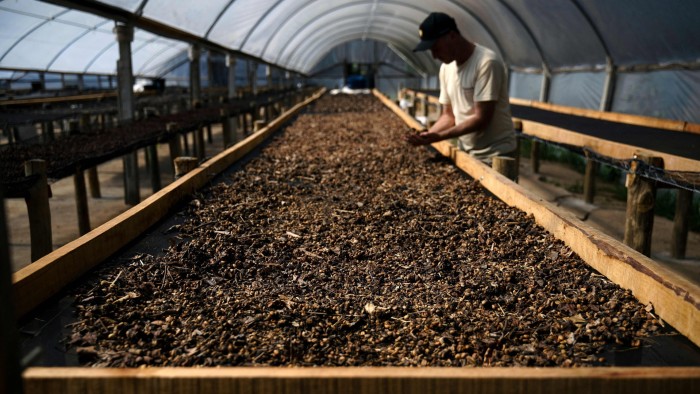Open the Editor’s Digest free of charge
Roula Khalaf, Editor of the feet, chooses her preferred stories in this weekly newsletter.
Coffee reached its greatest in almost 50 years on Wednesday as issues over an international supply lack contributed to market unpredictability over the effect of inbound EU laws on logging.
Futures tracking higher-quality arabica beans increased 4.7 percent to $3.23 a pound in New york city, their greatest levels because 1977, to extend the rally in costs this year to more than 70 percent.
London futures for more affordable robusta beans, utilized in instantaneous coffee, increased 7.7 percent to reach $5,507 a tonne, almost double their cost at the start of the year.
Traders stated the relocation had actually been driven by coffee roasters, industrial purchasers who process beans for intake, intending to protect products ahead of most likely scarcities and unpredictability over the status of a brand-new EU law that prohibits utilizing deforested land for crops.
” I have actually never ever seen anything like this before,” stated Tomas Araujo, trading partner at brokerage StoneX. “This is not going to be fixed this year which’s why the roaster has actually begun entering into panic mode.”
Hot and dry weather condition in Brazil has actually stired issues that output from the world’s greatest arabica manufacturer will fall next season, minimizing tight international products. The nation suffered its worst dry spell in 70 years in August and September, followed by heavy rains in October, causing issue the blooming crop will wither.
This follows 3 successive years of supply deficit for robusta beans, as an outcome of bad weather condition in Vietnam, the greatest robusta-producing nation. Brazil’s 2025-2026 arabica harvest looks set to fail, simply when the market was counting on it to put the marketplace into a supply and need surplus, Araujo included.
The rush to protect basic material has actually been worsened by European importers purchasing up beans earlier than normal this year, as they face unpredictability over brand-new EU legislation which needs them to show the coffee they import into the bloc was not grown on deforested land.
EU authorities are because of use a 12-month hold-up to the legislation, which enters into result at the start of the brand-new year. Nevertheless, legislators in the bloc have actually likewise proposed changes to the law, however are opposed by member states. An arrangement is not most likely till mid December. Traders are worried the hold-up might not be authorized, or would come late to be taped in law by the end of the year.
With European roasters hurrying to develop their stocks for next year, “United States roasters have actually entered into the marketplace too to ensure they do not get evaluated,” Araujo stated.
United States roasters are likewise reacting to president-elect Donald Trump’s guarantee to enforce import tariffs on a variety of products as soon as he takes workplace in January, stated Carlos Mera, head of farming products at Rabobank.
” If you are a roaster and you think that there will be tariffs on coffee, you will attempt to import now, since otherwise you will be paying tariffs later on,” stated Mera, including that about 23 percent of international exports go to the United States.
Customers, currently dealing with greater coffee costs, need to anticipate to see more boosts, Mera stated. “The boost in costs we have actually seen just recently are not since of the current rally, however the last one,” he stated, describing the rise in robusta costs previously this year. “So there is still a lot more discomfort coming for customers.”


